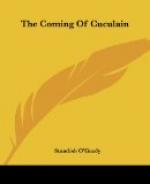“Thou shalt not go alone,” they said. “We have shared in thy glory and thy power, we will share all things with thee.”
They put their right hand into his on that promise. One hundred and fifty nobles of the nobles of that territory did the same, for with Naysi as their captain they did not fear to go upon any enterprise. They knew that expatriation awaited them, but they had rather be with Naysi and his brothers in a strange land than to live without them in Ireland. So the Clan Usna with their mighty men stormed the dun and bore off Deirdre and went away eastward to the Muirnicht. And they crossed the Moyle [Footnote: The sea between Ireland and Scotland. “Silent, O Moyle. be the roar of thy waters,”] in ships into the country of the Albanagh, and settled on the delightful shores of Loch Etive and made swordland of the surrounding territory. Great, famous, and long remembered were the deeds of the children of Usna in that land.
CHAPTER XI
THERE WAS WAR IN ULSTER
“Each spake words of high disdain
And insult to his heart’s best brother,
They parted ne’er to meet again.”
—Coleridge
It was on account of this that there arose at first that dissidence and divergence of opinion in the great Council at Emain Macha between Concobar Mac Nessa and Fergus Mac Roy, Concobar standing for the law which he had been sworn to safeguard and to execute, and Fergus casting over the lovers the shield of his name and fame, his authority and his strength, and the singular affection with which he was regarded by all the Ultonians.
After Fergus had made that speech in disparagement and contempt of the solemn enactment and decree in accordance with which Deirdre had been immured, Concobar did not immediately answer, for he knew that he was heated both on account of the abduction and on account of the words of Fergus. Then he said—
“The valour of the Red Branch, whereby we flourish so conspicuously herein the North, doth not spring out of itself, and doth not come by discipline, teaching, and example. It has its root in a virtue of which the bards indeed, for bardic reasons, make little mention though it hold a firm place in the laws of the Ultonians both ancient and recent. This, our valour, and the famous kindred virtues through which we are strong and irresistible, so that the world has today nothing anywhere of equal glory and power, spring from the chastity of our women, which is conspicuous and clear-shining, and in the modesty and shamefastness of our young heroes, and the extreme rarity of lawless relations between men and women in Ulla, the servile tribes excepted, of whom no man maketh any account. Against such lawlessness our wise ancestors have decreed terrible punishments. According to the laws of the Ultonians, those who offend in this respect are burned alive in the place of the




